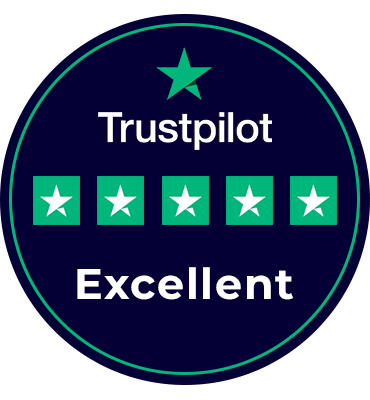Tips to Convert Manufacturing Leads into Customers
Manish Kumawat
Last Updated on: 07 October 2025
If you ask a marketing team of a manufacturing business, they will admit that the most challenging task in the sales cycle is converting manufacturing leads into customers. It's a fact that most of the sales team fails at this stage. The journey of converting an initial spark of interest, and lead generation into a long-lasting business relationship needs a lot of effort.
For a successful lead conversion journey, you need to balance the needs of the client and your manufacturing company budget. When you study the successful lead conversion techniques of leading manufacturers, you can notice how they have a high conversion rate.
We will examine real-life scenarios and examine the process of turning manufacturing leads into customers in this article. In order to increase your conversion rates, we will also provide you with actionable tips and tricks that you can use right now.
Understanding the Manufacturing Sales Cycle
It's important to understand the manufacturing industry's unique sales cycle before implementing conversion strategies. Sales cycles in manufacturing, compared to other sectors, can be long out and frequently involve numerous decision-makers and thorough evaluation procedures. Understanding these small details enables you to modify your strategy to fit the unique requirements of prospects at every point.
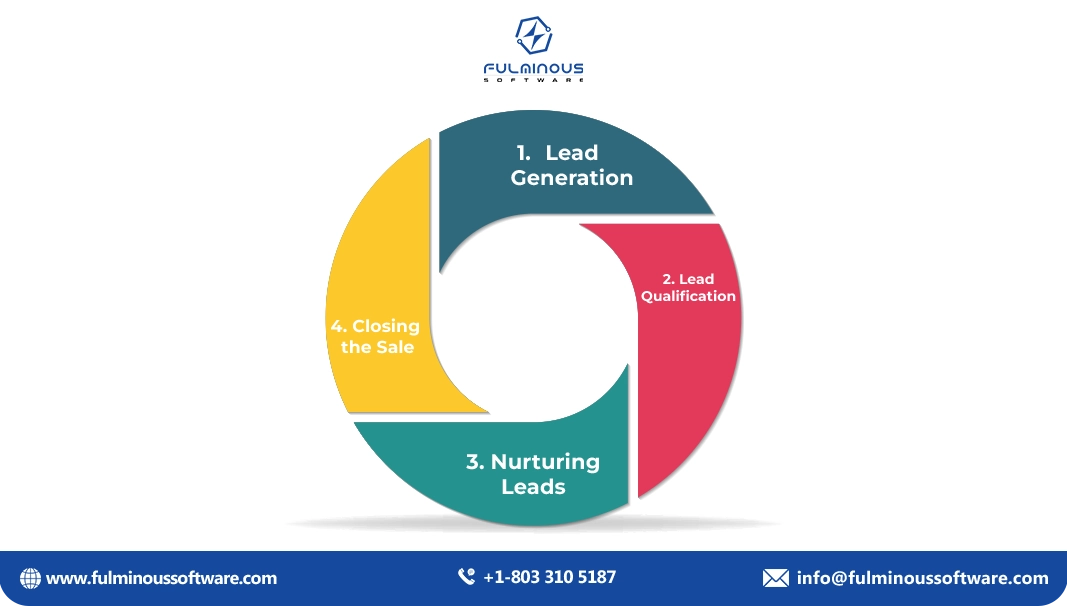
- Lead Generation: Attract potential customers through various channels, including online marketing, trade shows, networking events, and referrals.
- Lead Qualification: Evaluate leads to determine their suitability based on specific criteria such as budget, needs, and decision-making authority.
- Nurturing Leads: Build relationships with leads through targeted content, personalized communication, and regular follow-ups.
- Closing the Sale: Convert qualified leads into customers through effective negotiation, addressing objections, and delivering tailored solutions.
Converting the Leads to Long Term Business is the Secret of an Industry Leader's Success
Ever wondered how industry leaders turn a casual inquiry into a long-term partnership? It wasn't just about having a great product; it was about knowing how to connect with potential customers.
The secret sauce to industry success lies in converting leads into long-term business relationships. It's not just about the manufacturing lead generation; it's about nurturing those connections, understanding their evolving needs, and consistently delivering value. Think of it like cultivating a garden: you plant the seeds, water them regularly, and watch them grow into something beautiful.
By focusing on building strong relationships, providing exceptional customer service, and staying attuned to industry trends, you can transform one-time leads into loyal, repeat customers. Remember, it's not just about closing the deal; it's about creating a partnership that stands the test of time.
The Importance of Converting Manufacturing Leads into Customers
Converting manufacturing leads into customers is a critical aspect of any manufacturing business's success. It's the bridge between potential and profit, and a well-executed lead conversion strategy can significantly impact your bottom line.
Why is Lead Conversion Crucial?
- Revenue Generation:
- Direct Impact: Every converted lead translates into potential revenue.
- Sales Pipeline: A robust pipeline of qualified leads ensures a steady stream of income.
- Business Growth:
- Market Expansion: Successful lead conversion helps you tap into new markets and customer segments.
- Scalability: A strong customer base allows you to scale your operations and increase production.
- Customer Loyalty:
- Long-Term Relationships: Effective lead conversion fosters trust and builds long-lasting relationships with customers.
- Repeat Business: Satisfied customers become loyal advocates and return for future business.
- Competitive Advantage:
- Market Dominance: A higher conversion rate positions you as a market leader.
- Differentiation: Strong customer relationships set you apart from competitors.
- Data-Driven Insights:
- Performance Analysis: Tracking lead conversion metrics helps you identify areas for improvement.
- Strategic Decision-Making: Data-driven insights inform future marketing and sales strategies.
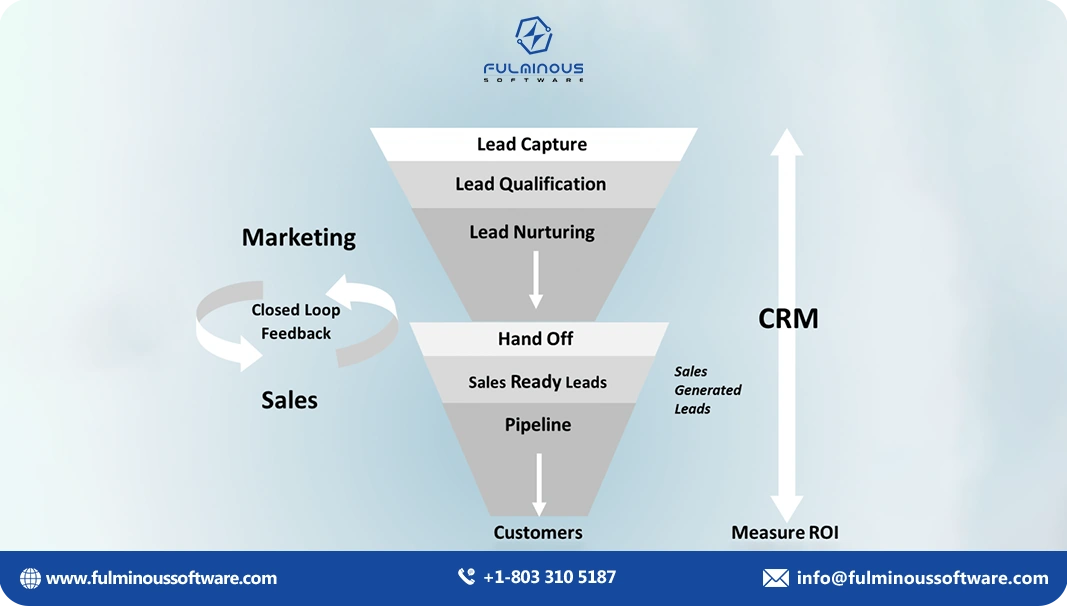
Remember It's Not Just About Closing the Deal; It's About Creating a Long-term Partnership
The real magic in manufacturing isn't just about closing a deal. It's about building a relationship that lasts. Think of it like making a new friend: you don't just meet them once and forget about them. You nurture the friendship, check-in, and offer a helping hand when needed.
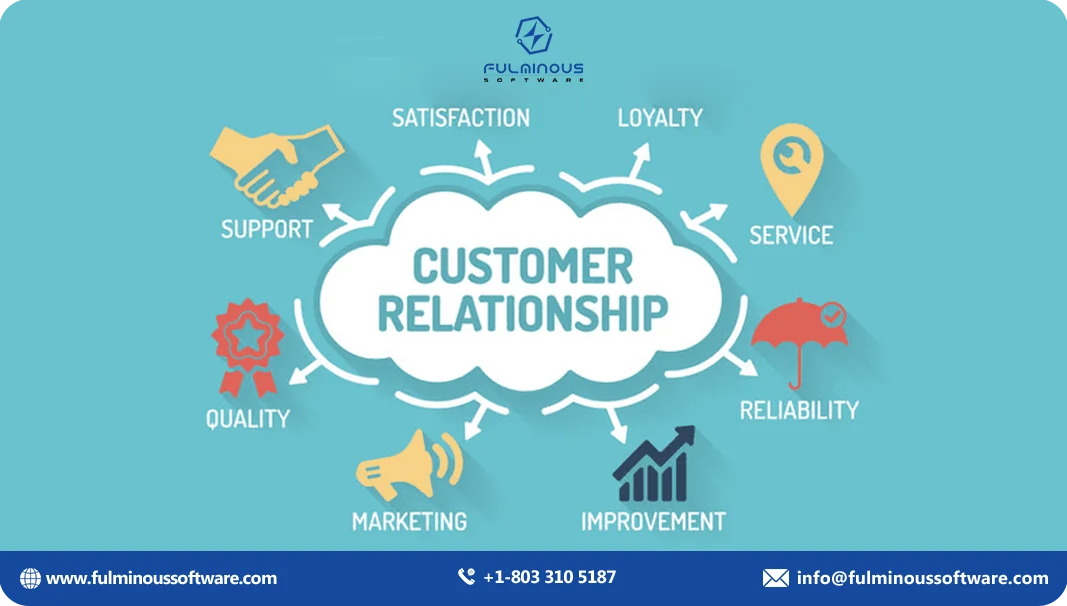
That's exactly how you should treat your customers. Instead of seeing them as one-time buyers, view them as potential long-term partners. By consistently delivering quality products, providing excellent customer service, and staying connected, you can turn casual customers into loyal customers.
Remember, a satisfied customer is a repeat customer. So, go the extra mile, offer exceptional service, and always strive to exceed expectations.
10 Secret Tips for Converting Manufacturing Leads into Long-term Customers
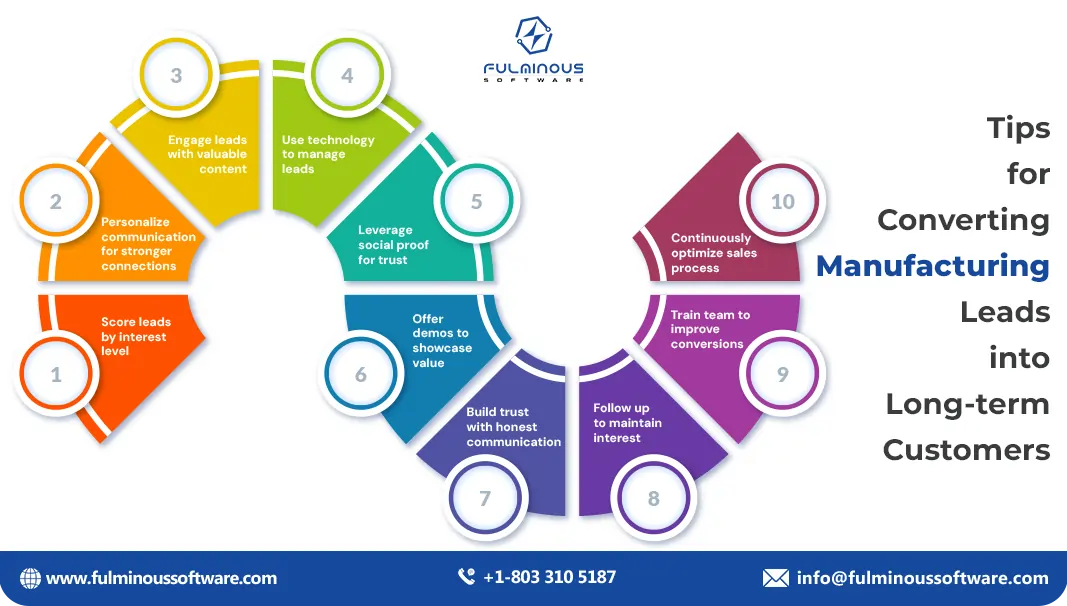
1. Prioritize Your Leads: A Simple Tip for Lead Scoring
Not all leads are created equal. Some are hot, some are lukewarm, and some are just plain cold. To sort through this mix, we use a handy tool called lead scoring.
How Does Lead Scoring Work?
- Engagement Level: Do they keep coming back to your website? Are they opening your emails? The lead is stronger when they are more involved.
- Demographics: Are they in your target industry? Do they work at a company the right size? The better the fit, the hotter the lead.
- Behavior: Have they downloaded a whitepaper? Attended a webinar? Requested a quote? These actions show they're ready to buy.
By scoring your leads, you can focus your efforts on the hottest prospects, leading to more conversions and less wasted time.
2. Connect with Your Leads on a Personal Level
In the manufacturing world, it’s all about building relationships. Personalize your communication to make connections stronger.
How to Personalize Your Approach:
- Know Your Audience: Understand your leads' industries, company sizes, and where they are in their buying journey.
- Use What You Know: Leverage the information you've gathered about your leads, such as their preferences and pain points, to craft more relevant communication.
- Speak Their Language: Understand the challenges your leads face and show them how your products or services can solve their problems.
By personalizing your communication, you strengthen connections, boost trust, and enhance conversions.
3. Educate and Engage: Content Marketing
Content marketing is an amazing way to attract, nurture, and convert leads. You establish credibility as an authority in the area and gain the audience's confidence by producing high-quality content.
- Informative Resources: Develop whitepapers, case studies, and eBooks.
- Interactive Sessions: Host webinars and workshops to engage with your audience.
- Regular Blog Posts: Share knowledge on industry trends and best practices.
4. Leveraging Technology to Streamline the Process
Using technology can be a game-changer for lead conversion.
- CRM Software: Manage leads, automate follow-ups, and evaluate results.
- Marketing Automation: Nurture leads with customized emails and monitor engagement.
- Social Media: Build brand awareness and share valuable content.
A CRM tool is like a personal assistant for your sales team. It helps you:
- Automate Follow-ups:Set up automated emails to stay in touch with your leads without overwhelming your team.
- Track Interactions:Monitor their activity on your website and emails to see what they're interested in.
- Manage Your PipelineOrganize your leads based on their stage in the buying process, so you can focus on the most promising opportunities.
By using a CRM tool effectively, you can streamline your sales process and boost your conversion rates.
5. The Power of Social Proof: Let Your Customers Do the Talking
Social proof is like a powerful endorsement from a trusted friend. It increases the likelihood that prospective clients will trust you when they see that other people have had good experiences with your goods or services.
- Share the Love: Showcase positive feedback from satisfied customers on your website, social media, and marketing materials.
- Tell Compelling Stories: Create case studies that highlight how your products have solved real-world problems for your clients.
- Encourage Reviews: Ask your customers to share their experiences on platforms like Google, LinkedIn, or industry-specific review sites.
Your marketing approach can increase conversions by establishing credibility and trust through the use of social proof.
6. Let Them Try Before They Buy: The Power of Free Trials and Demos
In the manufacturing world, it's often easier to show than to tell. That's why offering free trials or demos can be a powerful tool for converting leads.
- Personalized Demos: Tailor your demos to each lead's specific needs and challenges. This shows you understand their business and can offer solutions that fit their unique situation.
- Limited-Time Offers: Create a sense of urgency by offering free trials for a limited time. This encourages leads to take action and experience your product quickly.
- Follow Up: After the trial or demo, follow up with your leads to gather feedback and address any concerns they may have.
By offering free trials and demos, you can reduce the risk for your leads and make it easier for them to choose your product or service.
7. Nurturing Relationships: The Key to Long-Term Success
The base of any strong business relationship is trustworthiness. Here are a few tips to build trust with your leads:
- Be Honest and Transparent: In all of your communications, be direct and truthful.
- Keep Your Promises: Regardless of how minor the promise is, fulfill it.
- Be Responsive: Resolve queries and problems immediately.
- Show Empathy: Understand your leads' perspective and offer support.
Networking: Your Secret Weapon
Networking is a powerful tool for building relationships in the manufacturing industry.
- Attend Industry Events: Go to trade shows, conferences, and local industry meetups to meet potential customers and showcase your products.
- Join Industry Associations: Becoming a member of relevant associations can help you connect with industry professionals and establish your credibility.
- Leverage Social Media: Use platforms like LinkedIn to connect with industry professionals, share valuable content, and engage in discussions.
By building strong relationships and networking effectively, you can increase your chances of converting leads into loyal customers.
8. Stay in Touch: The Power of Follow-ups
When it comes to converting leads, consistency is fundamental. Regular follow-ups help keep your company top of mind and show your commitment to helping your leads.
Here are a few follow-up strategies:
- Quick Follow-ups: After an initial meeting or email, follow up within a few days to thank the lead and reiterate the key points of the conversation.
- Check-In Calls: Schedule regular check-in calls to see how the lead is progressing and if they have any questions.
- Provide Value: Share additional resources, such as case studies, whitepapers, or blog posts, to help them learn more about your solutions.
By staying in touch, you can keep the conversation going and move your leads closer to conversion.
9. Invest in Your Team: The Power of Training
A strong and proficient sales team is vital to any successful manufacturing company. By investing in ongoing training and development, you can equip your team with the skills and knowledge they need to close more deals.
- Product Knowledge: The team should be proficient in your products. Any query a lead may have should be addressed by them.
- Sales Skills: Train your team on effective sales techniques, like how to handle objections, close deals, and build strong relationships.
- Industry Insights: Keep your team up-to-date on the latest industry trends and challenges. This will help them have more meaningful conversations with leads.
By investing in your team, you'll improve their performance, boost their confidence, and ultimately drive more conversions.
10. Always Be Improving: The Power of Optimization
To stay ahead of the competition, it's important to constantly evaluate and improve your sales process.
- Track Your Progress: Monitor your conversion rates at each stage of the sales funnel to identify any bottlenecks or areas where leads are dropping off.
- Learn from Your Mistakes: Ask leads who didn't convert why they chose not to buy. Your sales process can be improved with the help of this feedback.
- Experiment and Learn: Test different approaches, messaging, and content to see what works best.
By continuously analyzing and optimizing your sales process, you can increase your conversion rates and drive more revenue.
From One-Time Deals to Lasting Partnerships: A Manufacturing Success Story
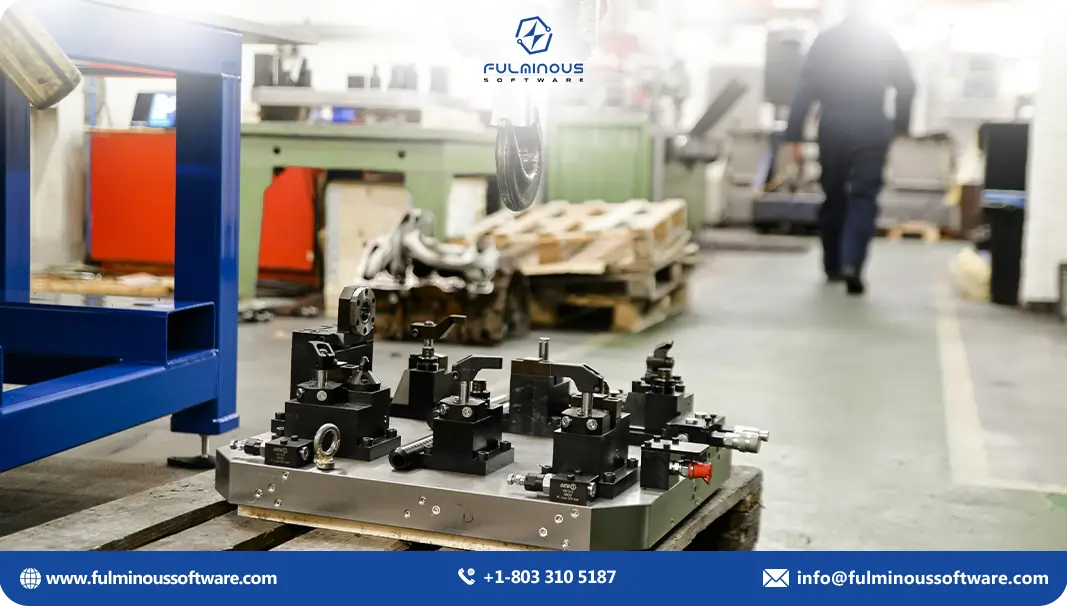
Vertex Precision Manufacturing, a big name in high-precision parts, faced a common problem: lots of leads, but not many long-term customers. They wanted to turn those leads into loyal partners, but they weren’t sure how.
The Challenges: A Tough Market
Vertex, a big player in high-precision manufacturing, faced a common challenge: lots of leads, but not many long-term customers. Here's why:
- Tough Competition: There were many companies offering similar products at similar prices.
- Losing Customers: Once they made a sale, they often struggled to keep those customers coming back.
- Building Trust: In a business where reliability is key, it took time to build trust with new customers.
Vertex knew they needed to do something different to turn those leads into loyal customers.
The Solution: A People-First Approach
Vertex knew they needed to do more than just sell products. They wanted to build relationships. Here's how they did it:
- Personalized Service: They treated each lead like a VIP, understanding their unique needs and tailoring solutions to fit.
- Quick Responses: They were fast to respond to inquiries, showing they valued their customers' time.
- Helpful Resources: They shared industry insights and tips to position themselves as experts.
Nurturing Relationships
Vertex didn't just make a sale and forget about it. They stayed connected:
- Regular Check-ins: They followed up with customers to see how things were going and if they needed anything.
- Building Trust: They were honest and reliable, always keeping their promises.
- Collaborative Partnerships: They worked closely with customers to achieve shared goals.
Leveraging Technology
Vertex used technology to streamline its process:
- Smart Software: They used a CRM tool to track leads, automate follow-ups, and analyze their performance.
- Targeted Marketing: They sent personalized emails and offers to keep customers engaged.
- Social Media: They used social media to connect with customers and share industry news.
The Results
This new approach paid off big time:
- More Repeat Business: Customers came back for more, boosting their revenue.
- Happier Customers: Customers were more satisfied and loyal.
- Faster Sales: They closed deals quicker and easier.
- Stronger Brand: They built a reputation for reliability and trust.
Key Takeaways
- Put People First: Build strong relationships based on trust and understanding.
- Be Responsive: Quick and helpful communication is key.
- Use Technology Wisely: Leverage technology to streamline processes and improve customer experience.
- Continuous Improvement: Always be looking for ways to improve your approach.
Conclusion
Converting manufacturing leads into loyal customers requires a well-rounded approach that focuses on relationship-building, providing value, and nurturing connections. Successful manufacturers understand that the journey from lead generation to a sustained partnership isn’t just a one-step process but involves consistent engagement, understanding of client needs, and leveraging insights for improved customer interactions. By incorporating these strategies, manufacturers can achieve higher conversion rates and create a robust customer base.
Personalized service, regular communication, and continuous support are vital in fostering trust and commitment with clients. As seen in real-life success stories, companies that prioritize client satisfaction and long-term value over quick sales are more likely to establish lasting relationships. Tools like CRM systems and automation can streamline these processes, allowing for personalized follow-ups and efficient management of client data, ultimately enhancing the customer experience.
Manufacturers who adopt a customer-centered approach can not only meet immediate sales goals but also strengthen their market position by cultivating a network of loyal clients. This commitment to relationship-building sets industry leaders apart, proving that the real key to sustainable success lies in converting one-time sales into long-term partnerships.
To get assistance in improving your manufacturing lead conversion rate, contact now
FAQs
- Q1: What is the main challenge in manufacturing sales?
- A: Converting leads into customers is challenging due to lengthy sales cycles, multiple decision-makers, and a need for relationship-building.
- Q2: Why is lead conversion important for manufacturing businesses?
- A: Lead conversion drives revenue, supports growth, builds customer loyalty, and provides a competitive advantage in the manufacturing market.
- Q3: What steps are involved in the manufacturing sales cycle?
- A: Steps include lead generation, qualification, nurturing, and closing the sale, each tailored to meet the client’s specific needs.
- Q4: How do industry leaders maintain high conversion rates?
- A: They prioritize client relationships, provide excellent service, and consistently adapt to customer needs, ensuring long-term partnerships.
- Q5: What role does relationship-building play in lead conversion?
- A: Relationship-building fosters trust, ensuring leads are more likely to convert and become repeat customers, enhancing long-term business value.
- Q6: How does CRM software assist in lead conversion?
- A: CRM tools automate follow-ups, track interactions, and organize leads, making it easier to convert prospects into loyal customers.
- Q7: Why are personalized demos effective for lead conversion?
- A: Personalized demos address specific customer needs, showing potential buyers how solutions fit their unique challenges, enhancing engagement.
- Q8: How can content marketing help in converting manufacturing leads?
- A: Content marketing establishes expertise and builds trust with leads by providing valuable insights, ultimately supporting lead nurturing.
- Q9: What is the impact of follow-ups on lead conversion?
- A: Consistent follow-ups keep the company top-of-mind for leads, improving chances of conversion by showing commitment and reliability.
- Q10: Why is investing in sales team training important for conversion?
- A: Training strengthens product knowledge and sales skills, enabling the team to handle objections effectively and close deals confidently.
HIRE A TOP SOFTWARE DEVELOPMENT COMPANY

 Verified
Expert in Software & Web App Engineering
Verified
Expert in Software & Web App Engineering
I am Manish Kumawat, co-founder of Fulminous Software, a top leading customized software design and development company with a global presence in the USA, Australia, UK, and Europe. Over the last 10+ years, I am designing and developing web applications, e-commerce online stores, and software solutions custom tailored according to business industries needs. Being an experienced entrepreneur and research professional my main vision is to enlighten business owners, and worldwide audiences to provide in-depth IT sector knowledge with latest IT trends to grow businesses online.
Partner with Top-Notch Web Application Development Company!
Discuss your Custom Application Requirements on info@fulminoussoftware.com or call us on +1-903 488 7170.
15 Days Risk-Free TrialRecommended Articles


